Facing the dilemma of dealing with rusted natural gas lines can be a daunting prospect for any homeowner. In our comprehensive guide,when to replace rusted natural gas lines, we delve into the critical signs that indicate it’s time to take action. Understanding the risks associated with corroded pipes is essential for maintaining the safety and efficiency of your home’s gas system. Join us as we explore the key factors to consider, from identifying rust to professional assessments, ensuring that you make informed decisions for the well-being of your family and home. Stay tuned for expert insights and practical advice!
What does a rusted gas line mean?
A rusted gas line indicates that the metal pipe transporting natural gas to appliances in your home has undergone corrosion.
This corrosion is typically a result of prolonged exposure to moisture or certain environmental conditions, leading to the breakdown of the metal.

Rust on a gas line is a serious concern because it can weaken the structural integrity of the pipe. This weakening increases the risk of gas leaks, which are dangerous and can lead to health hazards, environmental damage, and in severe cases, fires or explosions.
Recognizing a rusted gas line is crucial for maintaining home safety, as it signals the need for immediate inspection and potentially replacing the line to prevent hazardous situations.
When to replace rusted natural gas lines
The decision to replace rusted natural gas lines should be based on the following key indicators:
- Visible rust and corrosion: If there is evident rust, flaking, discoloration, or rust spots on the gas line, it’s a sign that the integrity of the line may be compromised and requires replacement.
- Unusual smells: A distinct sulfur-like or rotten egg smell, which is added to natural gas for detection, indicates a potential gas leak that could be due to a faulty line.
- Hissing or whistling sounds: These sounds near the gas line suggest that gas is escaping through small holes or cracks, indicating a compromised line.
- Appliance performance issues: Inefficient or inconsistent performance of gas-powered appliances may signal problems with the gas line.
- Dead vegetation: Plants or grass dying unexpectedly near the gas line could be a sign of a gas leak.
- Higher gas bills: An unexplained increase in your gas bill might indicate a small leak in your gas line.
Proper gas line inspection, repair, and safe maintenance by qualified experts are essential to avoid future concerns.

Possible risks of rusted gas lines
Rusted gas lines pose several significant risks that can impact both safety and health:
1. Gas leaks:
The most immediate risk of a rusted gas line is the potential for gas leaks. Rust can cause small holes or cracks in the pipe, through which natural gas can escape. This can lead to gas accumulation in enclosed spaces, posing a serious fire or explosion hazard if it comes into contact with an ignition source.
2. Health hazards:
Gas leaks, particularly in confined spaces, can lead to health issues for the occupants of the house. Symptoms of gas exposure include headaches, dizziness, nausea, and in extreme cases, asphyxiation. This is especially dangerous as natural gas is odorless, and an additive is used to give it a detectable smell.
3. Environmental impact:
Natural gas is primarily composed of methane, a potent greenhouse gas. Leaks from rusted gas lines contribute to environmental pollution and exacerbate climate change issues.
4. Fire and explosion risk:
The most dangerous consequence of a gas leak is the potential for fire or explosion. Natural gas is highly flammable, and even a small spark can ignite it if there is a sufficient concentration in the air.
5. Property damage:
Aside from the safety and health concerns, a gas leak can cause significant property damage, especially if it leads to a fire or explosion.
6. Economic loss:
Rusted gas lines and the consequent leaks can lead to increased energy costs as the gas escapes unused. Additionally, the cost of repairing damage from leaks and ensuring the gas system is safe can be substantial.
Addressing rusted gas lines promptly is crucial to prevent these risks and ensure the safety and well-being of those in the affected area. Regular inspections and maintenance are key to identifying and mitigating these risks early.
Critical signs that your gas line needs replacement
Recognizing the signs that your gas line needs replacement is crucial for maintaining safety in your home. Here are key indicators to watch for:
- Visible rust and corrosion: One of the most obvious signs is the presence of rust and corrosion on the exterior of the gas line. If you notice flaking, discoloration, or rust spots, it’s a clear indicator that the integrity of the line may be compromised.
- Unusual smells: Natural gas is odorless, but a distinct sulfur-like or rotten egg smell is added to help detect leaks. If you notice this smell in your home, it could be a sign of a gas leak due to a faulty line.
- Hissing or whistling sounds: Sounds like hissing or whistling near the gas line can indicate that gas is escaping from a small hole or crack, suggesting that the line may be compromised.
- Appliance performance issues: If your gas-powered appliances are not working as efficiently as usual, or if you notice inconsistent performance, it could be due to a problem with the gas line.
- Dead vegetation: If plants or grass near your gas line are unexpectedly dying, it could be due to a gas leak affecting the area.
- Higher gas bills: An unexplained increase in your gas bill might indicate a small leak in your gas line, causing more gas to be used than normal.
If you notice these signs, act promptly. Contact a pro to inspect your gas lines. They’ll evaluate, determine replacements if necessary, and safely perform required tasks. Regular inspections and maintenance by skilled technicians help prevent these problems.
The process of replacing rusted natural gas lines.
Replacing rusted natural gas lines is a critical process that should be handled professionally to ensure safety and efficiency. Here’s an overview of how this process typically unfolds:
Professional inspection:
The first step is to have a professional inspect the gas lines. This inspection will determine the extent of the rust and damage and whether a replacement is necessary.
Safety measures:
Before any work begins, safety measures are put in place. This may include turning off the gas supply to prevent any accidents during the replacement process.
Removal of the old line:
Once it’s safe, the old, rusted gas line is carefully removed. This involves detaching the line from the main gas supply and from any appliances it serves.
Installation of the new line:
A new gas line, typically made of corrosion-resistant materials like coated steel or plastic (such as polyethylene), is installed. These materials are less prone to rusting and corrosion.
Testing for leaks:
After installation, the new line is thoroughly tested for any leaks. This is a crucial step to ensure that the new installation is safe and there are no gas leaks.
Reconnecting appliances:
Once the new line is confirmed to be leak-free, it is reconnected to the gas appliances in the home. Each appliance is tested to ensure it is operating correctly and safely with the new line.
Final safety check and documentation:
The technician will perform a final safety check and provide documentation of the work done, including any warranties or guarantees on the new line.
Education for homeowners:
Finally, the technician will often educate the homeowner on signs of future issues, maintenance tips, and safety information related to the new gas line.
Homeowners mustn’t attempt to replace gas lines themselves due to the high risk involved. Always hire a qualified professional to handle gas line replacements. Regular maintenance and early detection of issues like rust can help prevent the need for emergency replacements.
Maintaining and preventing rust in gas lines
Preventive Measures and Maintenance for Natural Gas Lines:
Regular professional inspections: Schedule annual inspections with qualified technicians to check for signs of wear, rust, or damage to the gas lines.
Immediate repairs: Address any minor issues or damages found during inspections immediately to prevent them from escalating into major problems.
Environmental protection: Keep the area around gas lines clean and dry, as moisture accelerates rusting. Ensure proper drainage to avoid water accumulation near gas lines.
Corrosion prevention: Consider applying protective coatings to exposed gas lines to prevent rust and corrosion.
Monitor appliance performance: Regularly check the performance of gas-powered appliances. Inefficiency or changes in performance can indicate issues with the gas lines.
Awareness of landscaping changes: Be cautious with landscaping and gardening near gas lines. Root growth or soil erosion can affect the integrity of underground lines.
Educate household members: Ensure all household members know the signs of a gas leak and understand the importance of gas safety.
Avoid physical damage: During home renovations or any digging activities, be aware of the location of gas lines to avoid accidental damage.
Use of quality materials: If any part of the gas line requires replacement or extension, use high-quality, corrosion-resistant materials.
Emergency plan: Have a clear plan in case of a gas leak, including knowing how to turn off the main gas supply and whom to contact in an emergency.
By adhering to these preventive measures and maintenance practices, homeowners can significantly reduce the risk of gas line issues and ensure the safety and longevity of their natural gas system.
Conclusion
In conclusion, understanding When to replace rusted natural gas lines is more than just a part of home maintenance; it’s a crucial aspect of ensuring your family’s safety and peace of mind. Recognizing the warning signs and taking timely action can prevent serious hazards like gas leaks and explosions. We hope this guide has been informative in helping you identify when it’s time to replace those lines. Remember, regular inspections and addressing issues early are key. Don’t hesitate to consult with professionals for safe and efficient replacements. Stay safe and proactive in caring for your home’s natural gas lines.






